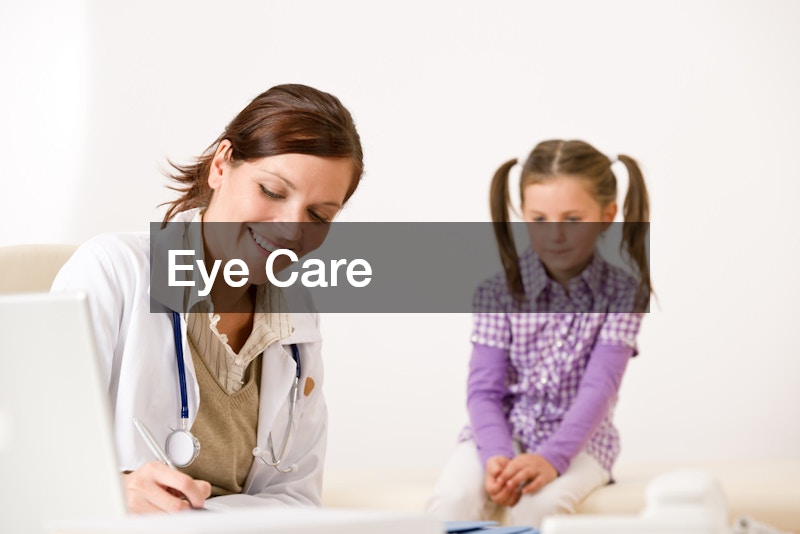When it comes to ensuring the health and well-being of children, there are various avenues to explore within the realm of healthcare. In recent years, parents have become increasingly proactive in seeking specialized services that cater specifically to children’s needs, often referred to as pediatrician related occupations. This article delves into the comprehensive healthcare options available, ranging from traditional pediatric care provided by pediatricians to specialized services like dental implants, urgent care, and holistic therapies. Each subject highlights the importance of understanding the healthcare landscape and ensuring children receive optimal care while navigating these numerous resources.
Accessing adequate coverage and quality medical services for children is vital for their development and overall health. Parents may find themselves overwhelmed by the various healthcare choices, creating a need for information regarding pediatric specialized fields. By exploring employee healthcare options and urgent care facilities, families can ensure that their children receive timely and appropriate medical attention, which is crucial for their growth and development.
Throughout this article, we will explore various pediatric specialist occupations and services available to children, including eye care, sports-related therapies, and assessments like hearing tests. By emphasizing the significance of comprehensive care, readers will gain insights into how to advocate for their child’s health, thus reinforcing the necessity for medical interventions and preventive measures that can substantially improve children’s lives.
Getting Coverage for Children

When seeking healthcare coverage for children, parents often turn to employee healthcare plans offered through their employers. These plans can provide access to a network of pediatricians and specialists, making it easier for families to navigate their child’s healthcare needs. It’s essential to review the specific coverage options and benefits, especially concerning preventive services and pediatric specialist visits, which are vital in the early years of a child’s life.
In addition to traditional employee healthcare options, many families are also exploring alternative coverage plans that might better meet their children’s needs. This includes options like Health Maintenance Organizations (HMOs) or Exclusive Provider Organizations (EPOs), which can offer a wide range of pediatrician related occupations at reduced costs. Understanding the parameters of these plans will aid in making informed decisions about the types of care that children can easily access.
As healthcare costs continue to rise, securing comprehensive coverage is more important than ever. Programs like CHIP (Children’s Health Insurance Program) can help fill the gaps for uninsured children, ensuring that they receive necessary healthcare services, such as vaccinations, check-ups, and urgent care visits. Parents who stay informed about their options, including employer-sponsored plans and government programs, can secure better healthcare for their children.
Finding Urgent Care
For many parents, immediate health care access is crucial, especially when their child falls ill or sustains an injury outside of regular office hours. Urgent care facilities provide an excellent alternative to emergency rooms, allowing families to seek care for non-life-threatening conditions in a timely manner. These centers are equipped to handle a variety of pediatric situations, from minor injuries to sudden illnesses.
When searching for a reliable urgent care facility, it’s essential to consider those that specifically cater to children. Some urgent care centers employ pediatric specialists, ensuring that children receive age-appropriate care and attention. Familiarizing oneself with the locations, hours of operation, and capabilities of these facilities can help provide peace of mind when immediate health concerns arise.
Parents should also confirm that their insurance covers services at the chosen urgent care facility. Clear communication regarding insurance coverage can prevent unexpected costs and ensure children receive care without unnecessary financial burdens. Moreover, understanding the pediatrician related occupations, linked with these facilities, allows parents to better navigate their child’s health journey.
Child’s Dentistry
Dental health is critical for children, setting the foundation for a lifetime of good oral hygiene practices. Parents concerned about their child’s dental health should consider consulting with specialized pediatric dentists who focus on dental care for younger patients. These professionals are trained to handle common issues such as cavity treatments and dental implants considerations in a child-friendly manner.
Regular dental visits can help detect potential problems early on, ensuring that children maintain optimal oral health. Engaging in preventive care, such as fluoride treatments and sealants, greatly reduces the risk of decay and other dental issues. It’s wise to make dental appointments part of the overall healthcare routine, much like regular check-ups with pediatricians.
In addition to routine check-ups, parents should promote healthy dental practices at home, like brushing and flossing regularly. By combining professional dental care with at-home practices, families can maximize their children’s oral health. Understanding the importance of dental care in the context of pediatrician related occupations can also foster a comprehensive approach to children’s health.
Care Pediatricians Don’t Perform

While pediatricians are often the first point of contact for children’s healthcare, many critical areas require specialized care that they do not provide directly. This includes essential services like hormone support for children experiencing growth issues or pubertal development concerns. When faced with these specific needs, parents must consult specialized endocrinologists who are well-versed in managing these complex situations.
Several pediatric ailments or conditions may require multi-disciplinary approaches that go beyond the scope of a pediatrician’s practice. For instance, conditions affecting growth and development often require closely monitoring hormonal levels and addressing imbalances with targeted therapies. Recognizing the need for specialized interventions emphasizes the importance of understanding pediatrician related occupations, allowing parents to seek the right care more effectively.
Moreover, exploring alternative therapies such as massage therapy for children can provide additional support for emotional and physical health. Integrating these adjunct therapies can create a well-rounded healthcare approach, which emphasizes physical, emotional, and psychological well-being in children. Parents must remain informed about all available resources, including the various specialists that support their child’s healthy development.
Children in Sports
Engaging in sports is a vital part of childhood; however, it can present risks for injury that necessitate proper management and therapy. As children partake in physical activities, they may encounter conditions that require the expertise of orthopedic doctors specializing in musculoskeletal injuries. Understanding the role of these specialists can help parents proactively ensure their children receive the best possible treatment.
Besides physical injuries, children’s sports participation may require additional therapeutic interventions, including massage therapy. This form of therapy can assist in muscle recovery and injury prevention by promoting relaxation and improving flexibility. Recognizing the necessity of incorporating preventive care for children involved in sports can significantly mitigate risks and foster overall physical health.
Moreover, regular health screenings and assessments should accompany children’s involvement in sports. This may include physical evaluations or even baseline concussion assessments to better understand young athletes’ fitness levels. Access to specialists who focus on children’s sports-related health concerns strengthens the support system, showcasing the wide array of pediatrician related occupations available to families.
Healthcare Specialties
The landscape of healthcare has evolved, leading to various specialized fields designed to perform specific services for children. Among these are orthopedic doctors who focus on conditions affecting bones, muscles, and joints. Parents need to be aware of the importance of these specialties for diagnosing and treating pediatric musculoskeletal issues, particularly in active children.
Understanding specialized healthcare options equips parents to navigate their children’s needs more effectively. Whether a child is faced with a fracture from sports or experiencing joint pain, the expertise of orthopedic doctors can offer tailored approaches to recovery. Moreover, pediatricians often refer children to these specialists based on their evaluations, highlighting the relationship between primary care and specialized services.
Integration of specialized services can provide a holistic approach to children’s healthcare. By collaborating with specialists, pediatricians ensure children receive a comprehensive assessment and treatment plan covering various aspects of their health. Awareness of pediatrician related occupations, especially those within specialized fields, can help parents advocate effectively for their child’s well-being.
Eye Care

Eye health plays a critical role in a child’s overall well-being and development. Regular check-ups with an optometrist are essential to identifying visual problems that may interfere with learning and daily activities. Early detection and intervention can make a significant difference, as many vision issues can be effectively treated when recognized early.
Parents should also be aware of the various factors that can affect their children’s eye health, such as excessive screen time and outdoor safety. Educating children about proper eye care can help foster healthy habits. Incorporating yearly eye exams as part of the overall healthcare protocol reinforces the importance of preventive measures in safeguarding children from potential issues.
As with other specialized healthcare segments, pediatrician related occupations play an integral role in referring children to vision specialists. By maintaining strong communication between primary care pediatricians and optometrists, families can ensure comprehensive care for their children’s vision. This collaborative approach emphasizes the interconnectedness of preventive care across various fields of pediatric healthcare.
Special Circumstances
Certain children may have special healthcare needs requiring additional resources and attention. Podiatry services, for example, can address common pediatric foot and ankle issues, including flat feet or gait abnormalities. These specialized services are vital to ensuring that children can participate fully in physical activities, which significantly impacts their overall health.
As parents navigate the world of specialized healthcare, they must remain vigilant about their child’s individual needs. Engaging with podiatrists can help manage issues that arise during formative years, ultimately promoting healthier development. Understanding how podiatry services can fit within the broader range of pediatrician related occupations empowers families to seek comprehensive support for their children.
Further, early intervention is key in managing issues that affect a child’s mobility and overall quality of life. Establishing connections with specialists allows families to proactively prevent complications that may arise later. Exploring all options within pediatric healthcare reinforces the importance of comprehensive strategies for children’s health.
Children and Chiropractors
Chiropractic services can offer various benefits for children, particularly concerning spinal health and nervous system function. Parents may consider consulting chiropractic care for their children when seeking treatment for posture-related issues, sports injuries, or general wellness. Incorporating chiropractic perspectives into overall healthcare can promote balance and optimal physical function.
Understanding the role of chiropractic care within pediatric healthcare can significantly enhance parents’ ability to provide holistic support. Chiropractors trained in pediatric health understand the nuances of dealing with children’s bodies and the unique adjustments required for growth and development. Collaborating with other pediatric specialist occupations can ensure that children receive comprehensive care that mitigates health issues before they escalate.
Most importantly, parents should prioritize finding chiropractors experienced in pediatric care. Investigating their qualifications, practices, and methods helps ensure children receive safe and effective treatments. By fostering an environment of healthy practices and addressing potential health concerns early, families can maintain their children’s well-being through various healthcare avenues.
Hearing Services

Hearing is a vital aspect of communication and learning, making regular hearing assessments crucial for children. Audiologists and hearing specialists are responsible for conducting hearing tests to identify any issues that may affect a child’s development or academic performance. Early detection of hearing loss can rearrange a child’s trajectory, providing timely interventions that support them in overcoming challenges.
Parents should prioritize their child’s hearing health as part of a comprehensive healthcare plan. Regular check-ups can help detect any abnormalities, allowing for strategies to mitigate potential impacts on speech and language development. Engaging in advocacy for children’s hearing services represents a critical component of ensuring their overall well-being.
Understanding the available options for childhood hearing services encourages families to remain proactive regarding assessments and interventions. By utilizing pediatrician related occupations that specialize in hearing care, parents build a supportive framework for their children’s growth. This integrated approach to health showcases the importance of communication across various healthcare specialties and highlights the commitment to holistic care.
Navigating the landscape of children’s healthcare can feel overwhelming; however, understanding the various pediatrician related occupations and specializations available simplifies the process. From urgent care facilities addressing immediate health needs to specialized services like podiatry and chiropractic care, families have access to diverse resources for all aspects of children’s health and well-being. Parents are encouraged to take an active role in their child’s healthcare decisions, utilizing a wide array of medical services, from dental visits to eye care and hearing tests.
By considering all facets of healthcare, including sports medicine, hormone support, and holistic therapies like massage therapy, families can ensure that their children are supported in every aspect of their growth and development. This comprehensive approach emphasizes the significance of preventive measures and timely interventions, promoting optimal health outcomes from an early age. Understanding the various specialists within pediatrician related occupations equips families to make informed decisions, advocate for their children’s needs, and foster lifelong well-being.
Ultimately, being proactive and educated about children’s healthcare can significantly impact their futures, equipping them with the tools needed for healthy, successful lives. In the ever-evolving world of healthcare, staying informed about accessible resources ensures that every child has the opportunity for comprehensive, quality care tailored to their unique health needs.




